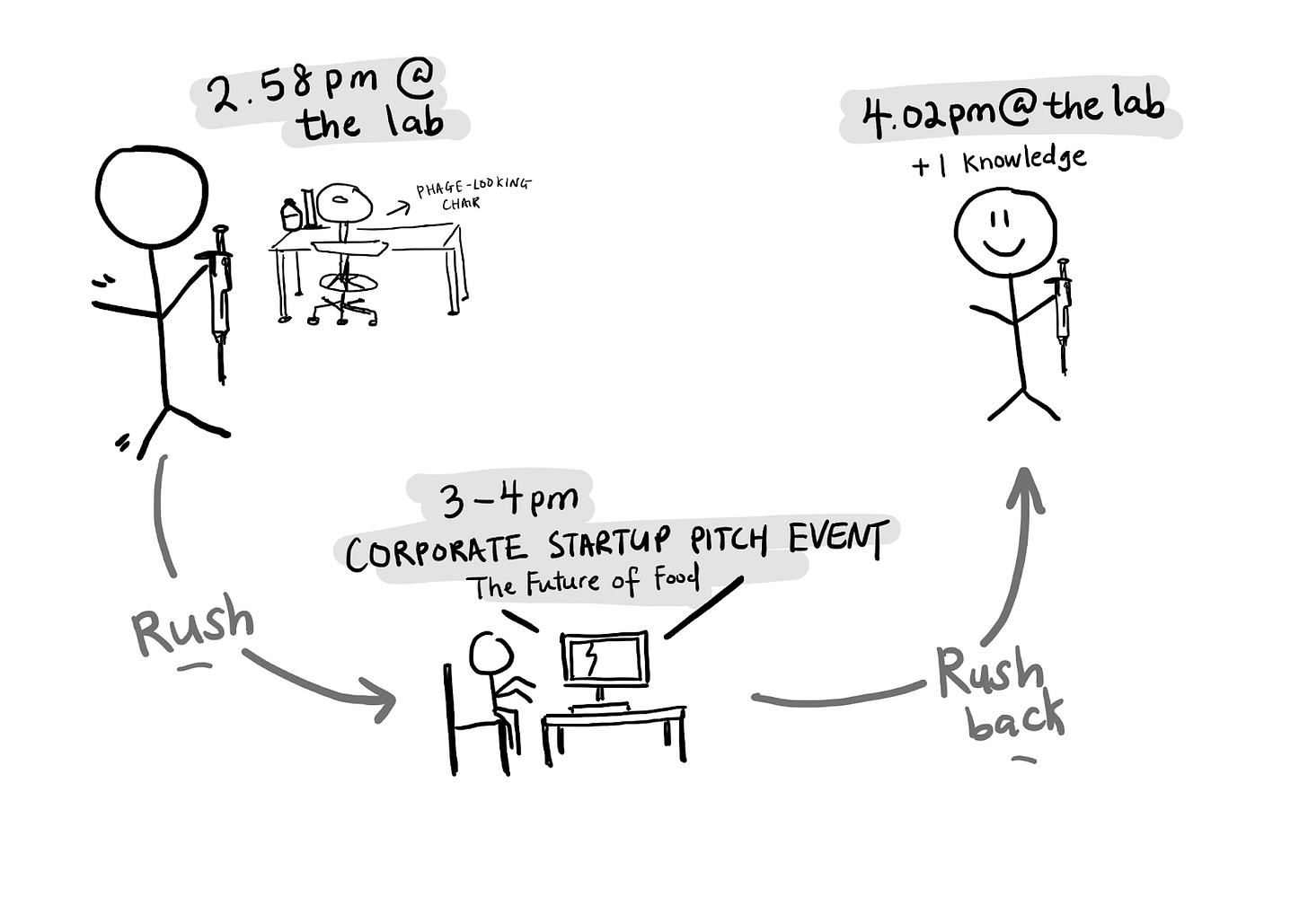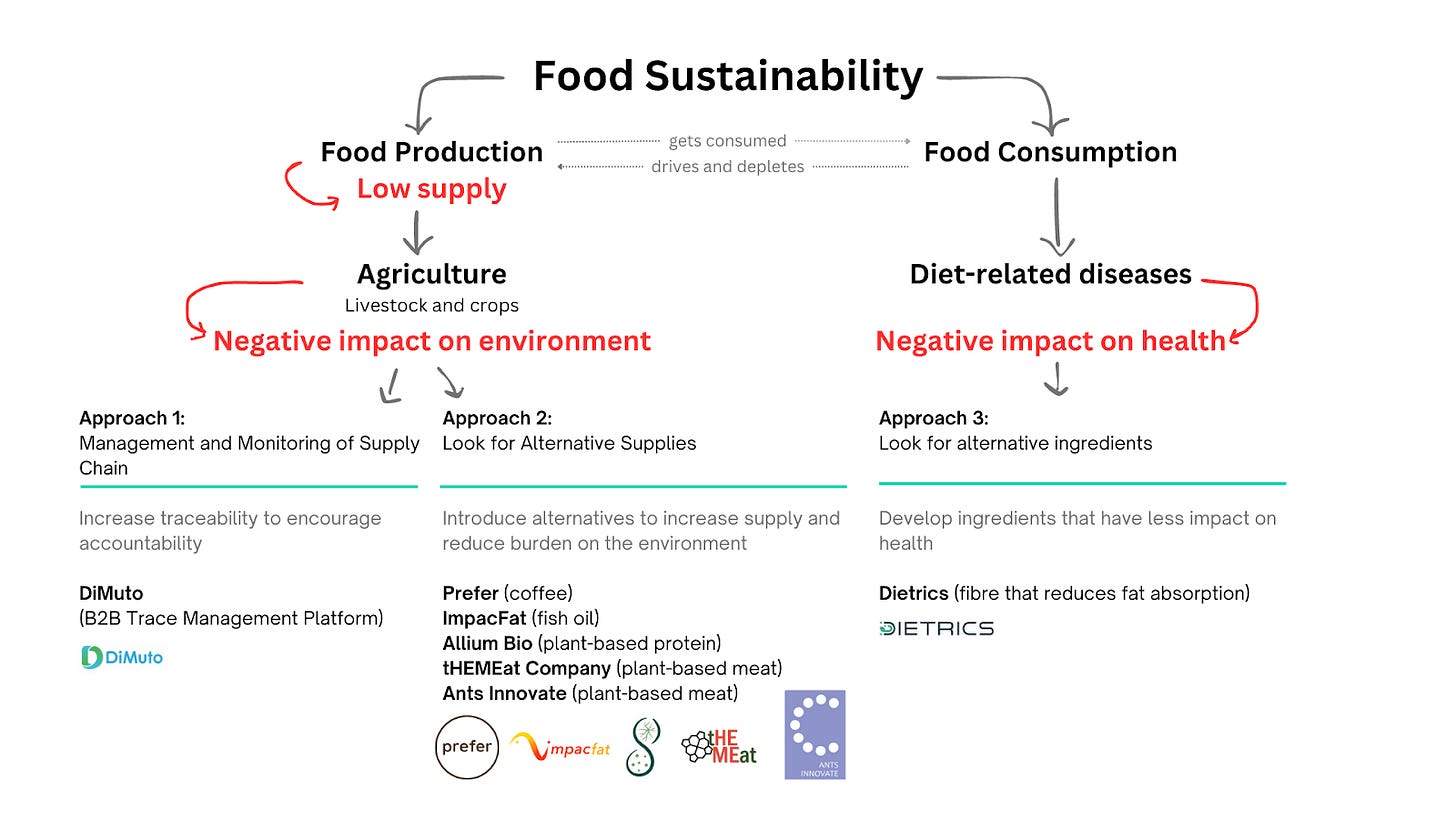The Nucleate Artery: Our Launch, Storing Memory in DNA, Transforming Heart Cells and AgriFood Startups
Plus: An interview with Dr Tan Min-Han from Lucence on the Nucleate Singapore Pulse, our Monthly Podcast!
Note: You should be receiving monthly updates right here in your inbox. If they are not coming in, check your spam folder and mark this address as ‘not spam’. They could also end up in the Promotions tab. Maybe take a peek there too?
Nucleate Singapore will be launching on the 7th of August! Look forward to our virtual info session led by Jiaqi and Sam, our super co-managing directors. The Nucleate team would like to thank all of you who have signed up for this virtual session, where we will be sharing the history of Nucleate and the core missions of Nucleate SG. We truly appreciate the support and the opportunity to share our vision for biotech in Singapore to you.
From the incredible number of sign ups, we now know for sure that there is indeed a community of biotech enthusiasts who want to learn more about an industry career. More than half of us on the Nucleate SG team are graduate students (say hello to us on the Community Slack! 👋), and we too have noticed that there has been more open conversations about going into non-academic roles.
We understand that academia might not be for everyone, and on top of that, there is a limit to the number of positions available (there’s a great 2019 Nature article written by Julie Gould about this). It makes sense to want to feel prepared for alternative career possibilities; including roles in the bioventure world, like in business development, venture capital and product development. More than anything, we believe that it would be reassuring to, at least, be able to envision what pathways are available so that we can begin the journey of figuring out what actually fits.
To encourage this, we are working towards building a foundation for facilitating cross-talk between academia and industry through our initiatives:
Nucleate Ignite: Skill-based workshops (more info here)
The Nucleate Artery: Monthly newsletter
Nucleate Singapore Pulse: Monthly Podcast
Singapore Life Sciences Community powered by Nucleate Singapore on Slack
Furthermore, we hope to build this biotech community with you! We are always on a hunt for good conversations and idea-sharing so we invite you to meet us over the #coffeechats channel on the Singapore Life Sciences Community Slack as a way to begin connecting with one another and build a strong and supportive network.
Now, on to some exciting work that has been brewing!
🍽️ Digestibles
(Research that has been published within the past 2 months)
1. Camera that Writes Memories into DNA 📸🦠🧬
DNA data storage has emerged as an innovative solution to challenges surrounding traditional data storage, including increasing energy consumption, hardware upgrades, and the need for significant physical space in data centres. As DNA molecules are exceptionally dense and stable, they can encode and store extensive digital information in a compact form. Consider the astounding contrast between 215,000 TB of data stored in just 1 g of DNA and only 2 TB in a 200 g hard disk! Furthermore, its natural biodegradable properties lead to reduced electronic waste compared to conventional methods.
Current state-of-the-art DNA storage requires converting data into DNA sequences, followed by in vitro synthesis, which involves complex equipment, is costly, and susceptible to errors. In this exciting article, first author Lim Cheng Kai along with the team led by Prof Chueh Loo Poh in CDE and SynCTI take a unique approach to address this limitation by delegating the process to living cells. Living cells naturally possess an ever-renewing source of DNA and sophisticated molecular machinery for reading, writing, and deleting genetic information. By incorporating “light switches'' known as optogenetics in cells, edits in the DNA can be made in response to the exposure of light. As this only stores the amount of light exposure, the scientists came up with the ingenious solution of preserving the spatial information, that is, by differentiating distinct pixels through barcoding. Having these two processes is akin to using an imager on a camera! They then enhanced the image retrieval process using machine learning algorithms, further emulating a digital camera. They could even multiplex this system with different colours of light, showing potential to become a full-fledged multicolor camera. More importantly, their innovative system is easily reproducible and scalable, setting it apart from earlier DNA data storage methods.
🍪 Bite-sized Analysis
The promising alternative approach of using already abundant DNA in our cells to store data holds great potential in revolutionising data storage. There is also the advantage of reducing costs associated with synthesising DNA from scratch! Overall, this makes using DNA more cost-effective and feasible for large-scale data storage. This strategy paves the way towards commercial viability and real-world applications. With further advancements, we envision that other digital formats can be encoded directly in the DNA, such as videos and audio, and maybe even a whole movie! Imagine the 270 kg, 18 km long film reel used for Oppenheimer or the visually aesthetic storytelling of Barbie stored together at the highest possible digital resolution - all in DNA that weighs less than a grain of salt.
2. Vitamin C Sparks Heart Cell Transformation 💊💖💪
Significant advancements in deriving cardiomyocytes (CMs) from human induced pluripotent stem cells (hiPSCs) offer promise in disease modelling and regenerative medicine. hiPSC-CMs in vitro models can mimic inherited and acquired heart diseases to facilitate the study of disease mechanisms and drug discovery. Just last year, Heartseed and Novo Nordisk conducted the first in-human trial and were successful in transplanting CM spheroids into patients with severe heart failure, with positive 26-week outcomes for the first patient reported in June.
Achieving maturity in hiPSC-derived cells, including CMs, remains challenging. Immature hiPSC-CMs with atrium-like characteristics pose a problem in drug development as heart disease drugs predominantly target ventricular cardiomyocytes. Its mismatched electrophysiology may also escalate arrhythmia risks in heart cell transplantation. To address this, Prof. Lei Ye's team from the National Heart Centre Singapore explored the use of ascorbic acid or Vitamin C as a cost-effective method to promote ventricular-like cardiomyocyte subtype. Their comprehensive study revealed higher expression of mature ventricular CM proteins and ion channels involved in excitation-contraction. While the electrophysiological characteristics showed progress towards ventricular-like action potential, further research is needed for proper electrophysiological maturation. The team also identified ascorbic acid's underlying mechanism, suggesting that it mediates maturation partially through DNA demethylation by TET1/TET2. This study brings us closer to harnessing the full potential of hiPSC-CMs in therapeutic applications.
🍪 Bite-sized Analysis
Compliance with Good Manufacturing Practice (GMP) is a critical requirement for materials used in manufacturing cell, tissue and gene therapy products (CTGTP). Ascorbic acid used widely as additive in food and in health supplements is a raw material with high traceability compared to rare small molecule drugs with more complicated process of synthesis and less matured GMP protocols. This could in turn mean that the approach of using ascorbic acid is more time- and cost-effective, and accessible for manufacturing clinical-grade and matured hiPSC-CMs. In Singapore, current interest in cell therapy primarily revolves around immune cell-based approaches, with dedicated GMP facilities established for their manufacturing [1], [2]. Although, these resources can be synonymously utilised to expedite the manufacturing of other cell therapy products in the future. In fact, efforts in facilitating the research and development of new pipelines have been concurrent [2], [3]. This is part of Singapore’s Manufacturing 2030 aim to make us a talent hub for advanced manufacturing. As these initiatives signify considerable advancement in the field of regenerative medicine in Singapore, we look forward to its potential to transform patient care and treatments for various medical conditions, including heart diseases.
If you're still craving for more exciting works from Singapore, why not check out:
Nature-inspired synthetic oligourea foldamer channels allow water transport with high salt rejection
Designing and synthesising a new class of artificial water channel with long-term stability for water purification.
Aromatic Yeasts: Interactions and Implications in Coffee Fermentation Aroma Profiles
Studying how different yeasts and lactic acid bacteria combinations interact during coffee fermentation to inform on the development of starter culture for diverse coffee flavours.
Developing a liposomal form of an omega-3 fatty acid (DHA) which can be injected directly into atherosclerotic sites to reduce inflammation and stabilise the plaques.
🥡 Event Takeaways
A focus on AgriFood startups
We attended the Corporate Startup Pitch Event: The Future of Food organised by SGInnovate on 18 July, where seven AgriFood startups presented a 5-min pitch. The event kicked off with a 15-min address by Jennifer Morton, the Corporate Engagement Manager at Good Food Institute APAC.
Each speaker was given 5 min to pitch their startup, and between each pitch was a 1-2 min interval. During this short interval, a poll was sent out to the audience allowing us to indicate our interest in connecting with the startup that had just finished their pitch.
This format kept the event’s duration to be within an hour, which we can imagine is quite a draw for many - a seminar over an hour long incubation or break is very doable!
^ a silly figure to show how Liyana managed to go from lab to the The Future of Food
Unlike other pitch events, this particular one did not have any panel discussion between the startups and a judging panel. Typically when there is a panel, questions asked to the startups help reveal critical points in evaluating the strengths and weaknesses of the startup: What is the pain point you are addressing? How is this technology better than existing solutions? What exactly is the data going into your algorithm?
While it informed us of the up-and-coming AgriFood startups here, we were left curious about how these AgriFood startups are getting along in their entrepreneurial endeavours.
So, to satisfy our curiosity, we did a bit of research on each of this startup, and here’s what we found:
Brief profile of the startups
These were the seven startups and their presenters:
DiMuto (Gracia Yuwono Kwantalalu) - AgriTrade management platform
Prefer (Jake Berber) - bean-free coffee
Allium Bio (Jon Ho) - animal-free meat: improve taste, appearance (colour)
tHEMEat Company (Max Tham) - animal-free meat: improve taste and texture
Ants Innovation (Shengyong Ng) - animal-free meat: improve taste, texture and appearance (colour)
Dietrics (Yan Ting Kek) - a substitute fibre that reduces fat absorption
Summary of the AgriFood solutions presented
We thought it would be useful to place these startups against a framework.
Here is what it looks like in our heads:
The pain points that these startups are trying to address are:
Low food supply,
Negative impact food production has on the environment, and
Negative impact food may have on human health.
These startups presented 3 approaches to mitigate the above challenges: 1) manage and monitor (that is, introduce traceability) the supply chain, 2) develop and produce alternative supplies, or 3) develop alternative ingredients.
Traceability platforms in the supply chain as a means to improve transparency is not exactly a new concept. It is, however, new in the context of the food supply chain in Singapore (context is everything sometimes!!!). Such systems are more established in many other industries, such as logistics, manufacturing and consumer goods. We quite enjoyed learning about how this could improve the supply chain as a whole. We also totally believed in DiMuto’s purpose and vision - and I'm not the only one! Read about how they're doing: [4], [5], [6].
Meat is a popular food we try to produce animal-free. To perfectly recreate meat - of any kind - is an objective we almost obsess over. We want cultivated meat to be indistinguishable from actual meat (We guess most people believe that it is only then that we can make a more seamless transition into choosing animal-free meat 🤔). Looking for alternative supplies of meat, be it animal-origin or not, is the space where 3/7 of the pitching startups exist, all of which are working to get a little closer to the appearance (colour-changing quality when heat is applied) and/or texture and/or taste (a particular iron-like meaty taste) of meat.
Similar efforts have been made to quietly slip substitute ingredients into existing foods (think parents trying to make their children eat vegetables 🥕🥦 by incorporating them into their favourite foods). Dietrics is developing a fibre that was claimed to be able to be applied in foods like ice cream with zero change in texture, taste and formulation - pretty bold statement, if we may add. The value add of this innovation is reduced fat absorption into the body, which would then help alleviate the risk of obesity, assuming the same mass of food intake.
We will end off here by reinforcing the point that this represents our personal learning points and views, and not that of Nucleate SG. Also - SGInnovate publishes their webinars on YouTube. You can find the recording of this event here.
🎧 Nucleate Singapore Pulse
View episode show notes and transcript
Who did we interview?
Nucleate interviewed Dr. Tan Min-Han, MBBS, FRCP (UK), FAMS, PhD, and also Founding CEO and Medical Director at Lucence who became a successful bio-entrepreneur after a career in medicine and research.
What did we talk about?
Dr. Tan highlights how Lucence leverages precision medicine to address the unmet need for early cancer diagnosis. He also talks about how we should shift our focus from medicine to health.
An interesting fact
In February 2023, Lucence, a Singapore-headquartered startup, successfully secured approval for its liquid biopsy test for lung cancer from Medicare, a US government-funded healthcare insurance programme for the elderly. This marks the first time an Asian healthcare services provider has secured US national insurance approval.
📆 Events happening this month
Entrepreneurship
Learn how to formulate a strong patent and strategies involved at this seminar organised by co11ab in collaboration with Mewburn Ellis
[11th Aug 2023, 4pm - 6.30pm, in-person]
Participate in a conversation with Mihir Pershad, CEO of Umami Meats, as he discusses leadership and innovation in shaping the future of food in this firestarter chat organised by SGInnovate
[16th Aug 2023, 5pm - 7pm, in-person]
Leading the Way: Firestarter Chat with Mihir Pershad on the Future of Cell-Based Proteins
Find out about groundbreaking ideas that can shape the future of science and society in this pitch event by Falling Walls Lab and SGInnovate.
[23rd Aug 2023, 2pm - 4pm, in-person]
Meet the leaders of Osteopore and discover how they combine science and business to make medical technologies successful in the market in this firestarter chat organised by SGInnovate.
[24th Aug 2023, 5pm - 7pm, in-person]
From Lab to Market: A Firestarter Chat with Osteopore on Commercialising MedTech Innovations
Get advice on finding the right partners and the difficulties involved through stories shared by speakers in this panel discussion organised by ClavystBio and BCS.
[5th Sep 2023, 5.30pm - 8.00pm, in-person]
Discover
Get insights into the research by Professor Ramnik Xavier from the Broad Institute of MIT-Harvard in this NUHS-NUS Microbiome Network Meeting.
[16th Aug 2023, 12pm - 2pm, in-person]
Disease Observatories - Path to Disease Mechanisms and Therapies
Explore what BLOCK71 have to offer as Singapore’s very own start-up hub!
[24th Aug 2023, 9am - 3pm, in-person]
Have more time to spare? Why not stay on after the Open House to network with BLOCK71 resident startups, alumni and the broader community!
[24th Aug 2023, 4pm - 5pm, in-person]
Delve into the world of microbiomes! Uncover cutting-edge technologies, products, and applications that enhance our health and well-being in this mini symposium organised by NUS, Department of Microbiology & Immunology.
[29th Aug 2023, 9.30am - 12.30pm, in-person]
Workshop
Dive into the world of blockchain entrepreneurship and ideate groundbreaking startup in this workshop jointly presented by NUS AIDF and NUS ENTERPRISE Blockchain Initiative.
[10th Aug 2023, 5pm - 7pm, in-person]
Come hear from experts about how you can improve your health and longevity in this seminar organised by SGInnovate
[30th Aug 2023, 6.30pm - 9pm, in-person]
Policy and Regulation
Explore the hurdles of IP protection in the era of generative AI and discover strategies to navigate them in this panel discussion organised by SGInnovate.
[5th Sep 2023, 5pm - 7pm, in-person ]
Guarding the Creative Frontier: Navigating IP Challenges in Generative AI
💭 Before you leave…
We’d like to leave you with a thought: what are your best stories about failure? We’d love to hear from you. Leave us your thoughts in our Community Slack (join here).











